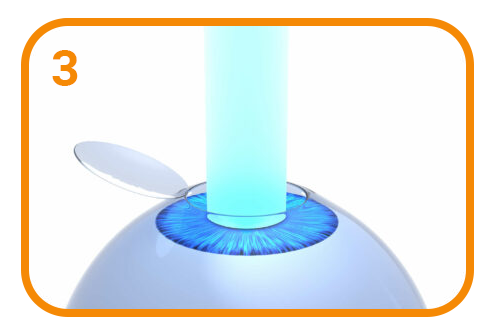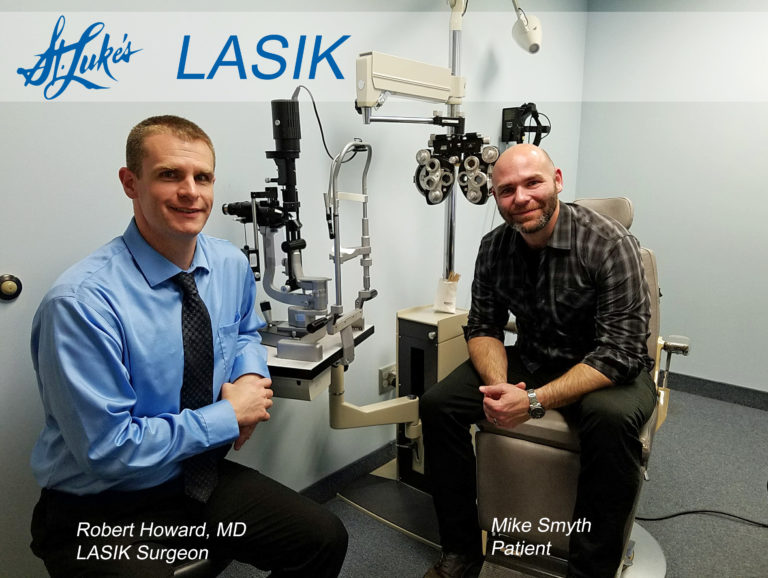For active individuals seeking vision correction, our experienced eye doctors offer comprehensive consultations to determine your candidacy for LASIK. This life-changing procedure has helped millions achieve better eyesight and enhanced quality of life.
LASIK (Laser-Assisted In Situ Keratomileusis) is a laser vision correction procedure that corrects refractive errors. These include nearsightedness, farsightedness, and astigmatism.
Refractive errors of the eye are caused by an irregular shaped cornea that prevents light from focusing directly on the retina, leading to blurry vision. LASIK eye surgery reshapes the cornea and corrects these refractive issues.
LASIK uses two lasers, an excimer laser, and a femtosecond laser. The femtosecond laser first creates a small flap in the cornea.
After making the flap, your surgeon will lift and expose the cornea tissue to correct it. Next, an excimer laser will be guided by a computer to remove a precise and predetermined amount of tissue from the cornea.
The flap is then laid down, where it acts as a natural bandage during recovery.
Although there is no denying that LASIK is a life-changing procedure, not everyone qualifies as a good candidate. Various factors go into your LASIK candidacy, like:
LASIK is only FDA-approved if you’re 18 or older. However, even if you’re at least 18, that’s not a guarantee that you’ll be a good LASIK candidate. However St. Luke’s does not offer LASIK or PRK evaluations for individuals under the age of 21.
You must have stable eyes that have not changed for at least 2 years to have LASIK. If your eyes are still changing due to age, St. Luke’s recommends waiting to have LASIK.
A crucial part of the LASIK candidacy process involves having a stable prescription. You may be a good LASIK candidate if your prescription has been stable for at least 2 years or more.
If your prescription is still changing at your eye exams, you should wait to undergo LASIK until it stabilizes. For many patients, their vision reaches this point once they are in their mid to late twenties.
Potential LASIK candidates should not be pregnant, nursing, or planning on becoming pregnant within 6 months of the procedure. Getting LASIK often causes changes to your eyesight, making it less stable.
Patients can expect the best results once their vision is stable and has remained that way. If you’ve been pregnant and are currently nursing or lactating, waiting at least four months after this before getting LASIK is recommended to ensure your eyes have time to adjust and become stable.
LASIK works because it involves reshaping the cornea and removing tissue to correct refractive errors. If you have a cornea that’s too thin, removing even a tiny amount of tissue from the cornea can cause serious complications.
You’ll have your corneal thickness measured during your consultation to ensure it’s safe for you to have LASIK.
Take our LASIK quiz today to find out if you’re a good candidate for LASIK.
Although they are effective, you may wonder if there’s something better available.
For those that qualify, a refractive procedure like LASIK can provide you with the life-changing results you’ve been looking for and, most importantly, visual freedom from glasses and contact lenses.
At St. Luke’s, our talented and experienced LASIK surgeons are here to help you achieve the vision you’ve always dreamed of having.

Because LASIK is an elective medical procedure, we do not accept medical insurance. However, the cost of LASIK is easy to offset using financing plans.
At St. Luke’s, we offer financing with CareCredit, which allows you to pay for LASIK immediately and then pay for your procedure with affordable monthly payments for up to 24 months. This option ensures patients can fit LASIK into their budget and achieve their vision correction dreams. We also accept FSA (Flexible Spending Accounts) and HSA (Health Savings Accounts) towards procedures.
There’s no reason why cost should stand in the way of better vision!
Before your LASIK procedure begins at St. Luke’s, you’ll receive numbing eye drops to avoid discomfort. Once these have the opportunity to spread over the surface of your eye, the procedure can start.
Depending on your refractive errors, this may require flattening or reducing the steepness of the cornea. How much tissue your LASIK surgeon removes is predetermined, ensuring that only the exact amount is reshaped for precise vision correction.
The flap is then placed back down and repositioned, creating a self-sealing bond and acting as a natural bandage on the eye. There are no stitches or sutures necessary.
After being cleared by Dr. Howard, you’ll need a trusted friend or family member to drive you home, as your vision will be unstable after LASIK due to inflammation in the flap formation. You may notice immediate improvements to your vision, but others may find it takes a few days to start seeing a difference. Each patient is different, and each recovery timeline is unique.




After having LASIK, go home and rest. As the numbing drops wear off, you may start experiencing discomfort such as a burning sensation, irritation, or grittiness.
These feelings should gradually improve on their own in the coming days after LASIK. Follow all instructions from your LASIK surgeon, including no eye makeup, keeping your eyes closed while showering or bathing, and no swimming for at least 2 weeks.
Your vision will improve in the days after LASIK, with most patients finding they can return to work the day after their procedure. Use all eye drops exactly as directed for the best results.
You’ll need to schedule follow-up appointments, including one for the day after your procedure, to check how your eyes are healing. Make sure to attend all scheduled follow-up appointments as necessary.
As your eyes heal in the weeks and months following LASIK, your vision will continue improving. Things will look sharper, clearer, and more detailed than ever before. You’ll be able to wake up and see without the need for corrective lenses.
If you are not a candidate for LASIK, there are other vision correction procedures worth considering. Your ophthalmologist may recommend one of the following instead:
PRK is a laser vision correction procedure that provides patients with virtually identical results to LASIK. The most significant difference between the two is that, unlike LASIK, PRK does not involve creating a flap formation on the cornea surface. PRK is not an inferior treatment to LASIK, the outcome is the same at 2 months.
Instead, the epithelium of the cornea is removed, which regenerates during the recovery process. Because of this, the PRK recovery is more prolonged than LASIK, but patients can look forward to freedom from visual aids like glasses and contact lenses after PRK.
A procedure like CLEAR is an excellent choice for patients who don’t qualify for cataract or LASIK surgery but want to experience visual freedom from glasses and contact lenses. CLEAR is a procedure that removes the natural lens of the eye and replaces it with an artificial lens (called an intraocular lens or IOL).
Depending on the IOL, patients can achieve incredible vision that can correct both distance and near vision. CLEAR lens can be performed before patients have cataracts, ensuring your vision stays crisp and clear for many years.
Not sure which procedure is the best fit for you? Schedule a consultation to find out!
“I used to wear contact lenses and besides being a bit of a pain to wear, they sometimes caused me to have eye irritation & infections. I drive by St. Luke’s every day on my way to work so I decided to see if LASIK was an option for me. It was and I’m very pleased with my outcome. I had my procedure done in the morning and by dinner time, I already noticed a bit of an improvement. Later that evening, I watched a movie and that was when I really began to notice the clarity and sharpness of my vision. The procedure was even quicker than I’d imagined as was the recovery time.
Thanks to Dr. Howard and his team. I recommend him to anyone considering LASIK.”
Mike Smyth
New Port Richey, FL
Thanks to Dr. Howard and his team. I recommend him to anyone considering LASIK.

Are you ready to find out if you could be a good LASIK or PRK candidate? Schedule your LASIK consultation at St. Luke’s Cataract & Laser Institute today!
We proudly serve patients at our eye clinics in Tarpon Springs, Tampa, St. Petersburg, Clearwater, Spring Hill, Wesley Chapel and in The Villages at Lake Sumter Landing and Brownwood. Our philosophy is to treat those we serve as though they are a member of our own families. From the first phone call or email to the follow-up visit and beyond, we’re here to serve you. Our goal is to help preserve and optimize your vision.

